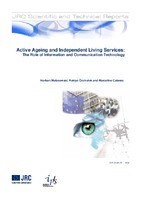Active Ageing and Independent Living Services: the Role of Information and Communication Technology

Συγγραφέας
Malanowski, Norbert
Özcivelek, Rukiye
Cabrera, Marcelino
Συλλογικό όργανο
European Commission / Directorate General for External RelationsΗμερομηνία
2008Προβολή/
Θεματικές επικεφαλίδες
Information and communication technologies ; Science and technology of informationΠερίληψη
This report highlights the main policies related to active ageing and the policy fields, health, work and retirement, where ICT-based services will be determinant. Active Ageing, i.e. the process of optimizing opportunities for health, participation and security in order to enhance quality of life as people age, comes up more and more often in European political discourse. Quality of life is largely determined by the ability of older citizens to maintain their autonomy and independence, hence the importance of products and services that support Independent Living Systems (ILS) and the potential of Information and Communication Technology (ICT) to enable them. ILS are enabling services designed to help people gain independence and to assist communities in eliminating barriers to independence. Active Ageing and ILS are integrative policy issues. They require input from different policy areas on both national and European levels: e.g. social policy, labour market regulation, health/care, housing, RTD, telecommunication and information society policy. A major challenge for the future will be developing ICT policies which are integrated into welfare, health and social inclusion policies and adapted to a changing society.
